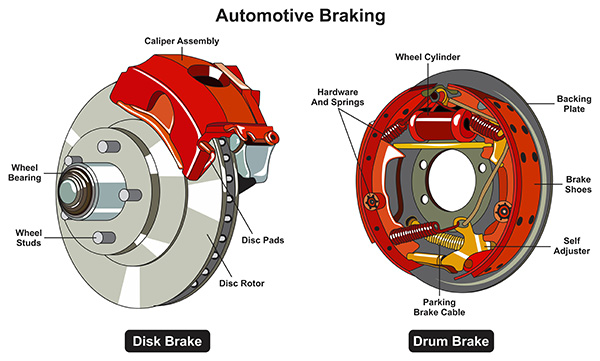
When it comes to your vehicle's safety and performance, the braking system plays a crucial role. Disc brakes and drum brakes are the two primary types of brakes used in modern vehicles, each with its own set of advantages and drawbacks. So, which one is better? Let's explore the mechanics, benefits, and downsides of both to help you make an informed decision.
Disc Brakes
Disc brakes are widely regarded for their efficiency and reliability. They consist of a brake disc, a caliper, and brake pads. When you press the brake pedal, the hydraulic fluid pushes the caliper, causing the brake pads to clamp onto the disc. This action generates friction, slowing down the vehicle.
Advantages of Disc Brakes
- Superior Heat Dissipation: Disc brakes are exposed to air, allowing better heat dissipation. This prevents overheating, which is crucial during high-speed driving or in mountainous areas.
- Enhanced Performance: They provide consistent braking power, ensuring better control over your vehicle, especially in wet conditions.
- Less Maintenance: Disc brakes are self-adjusting, reducing the need for frequent maintenance. They also tend to have a longer lifespan than drum brakes.
- Better Stopping Power: Due to their design, disc brakes offer more powerful and quicker stopping capabilities, which is essential for safety.
Drawbacks of Disc Brakes
- Higher Cost: Disc brakes are generally more expensive to manufacture and replace than drum brakes.
- Potential for Wear: The exposed components can be more susceptible to wear from dirt and debris.
Exploring Drum Brakes
Drum brakes, on the other hand, consist of a brake drum and brake shoes. When you press the brake pedal, the hydraulic fluid pushes the brake shoes outward against the drum, creating friction and slowing the vehicle.
Advantages of Drum Brakes
- Cost-Effective: Drum brakes are cheaper to produce and replace, making them a budget-friendly option.
- Effective for Parking Brakes: Their design is well-suited for parking brakes, providing a secure hold.
- Durability in Dirt: Drum brakes are enclosed, making them less prone to dirt and debris, which can be advantageous in off-road conditions.
Drawbacks of Drum Brakes
- Heat Buildup: Drum brakes are prone to heat buildup, which can lead to brake fade during extended use.
- Inconsistent Performance: They may not perform as consistently as disc brakes, especially in wet or extreme driving conditions.
- More Maintenance: Drum brakes require regular adjustments and maintenance to ensure optimal performance.
Comparing Performance in Different Conditions
City Driving
In city driving, where frequent stopping is required, disc brakes shine due to their superior heat dissipation and consistent performance. The quick response of disc brakes can make navigating traffic and stopping at signals smoother and safer.
Highway Driving
On the highway, both disc and drum brakes perform adequately, but disc brakes provide an edge with their ability to handle high-speed stops more effectively. The heat resistance of disc brakes ensures that prolonged braking doesn't compromise performance.
Off-Road and Heavy-Duty Use
For off-road and heavy-duty use, drum brakes have a slight advantage due to their enclosed design, which protects against dirt and debris. However, disc brakes still offer better control and reliability for overall performance.
Maintenance and Longevity
Maintaining your brakes is crucial for safety. Disc brakes typically require less frequent maintenance compared to drum brakes, which need regular adjustments and part replacements. While drum brakes might last longer due to their enclosed nature, disc brakes provide more consistent and reliable performance over time.
Schedule a brake inspection with DS Auto Experts to ensure your vehicle's braking system is in top condition. Contact us today to book your appointment!